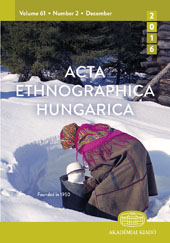Pentatony as a vehicle of identity in Hungarian music
Pentatony as a vehicle of identity in Hungarian music
Author(s): Katalin PaksaSubject(s): Customs / Folklore, Music, Ethnohistory, Cultural Anthropology / Ethnology, 19th Century
Published by: Akadémiai Kiadó
Keywords: folk music; ethnomusicology; composed music; music pedagogy;
Summary/Abstract: Owing to its strong emotional effect, music plays a great role in experiencing and expressing self-identity. In Hungary, 19th century compilers of folksong collections consciously professed the national value of their work, while they were embarrassed by the tonality of genuine folksongs, having an aversion to pentatonic tunes. In the early 20th century, it was exactly this tonal world that attracted Bartók and Kodály and helped them to develop their own compositional style and create sovereign Hungarian music in opposition to German romanticism. Pentatony recognized in folk music aroused their interest in researching eastern, prehistoric connections and also inspired them to carry on the stylistic interpretation of the Hungarian folk music stock. Kodály based his music pedagogical conception on the acquisition of the musical mother tongue, fi rst of all pentatonic folksongs, which he meant as a remedy against the identity crisis of the society. The role of pentatony as a vehicle of identity has been verifi ed by new achievements of ethnomusicology which has explored the importance of the fi ve-tone scale in the history of Hungarian folk music more thoroughly.
Journal: Acta Ethnographica Hungarica
- Issue Year: 55/2010
- Issue No: 1
- Page Range: 1-10
- Page Count: 10
- Language: English
- Content File-PDF

